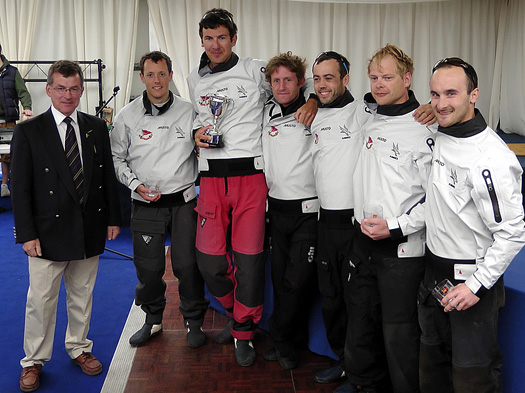Displaying items by tag: Wilson Trophy
#WilsonTrophy – Team racing's annual pinnacle, the Wilson Trophy, came to a close this afternoon with a worthy victor in West Kirby Hawks. Two Irish teams competed in the 22 rounds event.
The third and last day of racing on the Wirral seaside town's Marine Lake, overlooking the River Dee and with Wales as a backdrop, was roundly won by the local favourites, who beat Wessex Exempt 3-1 in the Final.
Kinsale Yacht Club and Howth Yacht Club finished 21st and 22nd from the 28 competing teams. Download results below.
For the last day of the Wilson Trophy, the wind had swung into the south, blowing out of the River Dee estuary, starting in 15 knots gusting to 18, then veering and dropping to below 10, for the final rounds. The Swiss League qualifiers ended after 22 rounds, before moving into best of three Quarter Finals and Semis and best of five Finals. These truly showcased team racing at its very highest level, with spectators lining the shallow banks of the Marine Lake providing a soundtrack of gasps, whoops, hollas and outcrys as the titans of the sport slogged it out.
West Kirby Hawks hasn't won the Wilson Trophy since 2012, but the team is the reigning World Champion, following their victory in Schull, Ireland in 2011. In fact this year is the first time since Schull, that the World Championship winning line-up of Andrew Cornah, Ben Field, Dom Johnson, Hamish Walker, Tom Foster, Debs Steele have regrouped. The reason for 'getting the band back together' is the team's desire to defend its title this year at the ISAF Team Racing World Championship due to be held on Rutland Water in July.
"The Wilson is the pinnacle of team racing, because there are so many fantastic teams here pitting it out," explains West Kirby Hawks leader Dom Johnson, who flew in from Singapore especially for the event. Here he was reunited with his crew, Debs Steele, one of the most capped Wilson Trophy competitors of all time, having sailed it 23 times and been in the final 12 times. "If you look at any of the top eight teams, any one of them can perform and take races off the other."
Saying that, West Kirby Hawks finished the Swiss League qualifiers having only been beaten in three after 22 races. In fact throughout this Wilson Trophy they only suffered four defeats. However, as Johnson pointed out, their races "weren't walkovers. They were gritty races where we were having to do conversions and come-backs. There weren't too many 1-2-3 sail-aways. The conditions were part of that, because it was quite changeable, but that was great for us in terms of progression and practice."
The Finals also saw a number of incidents, including a major one which Johnson (fourth from the right above) admitted he may have caused, as he explained: "Mark 3 at the bottom of the run can often be a 'point of congestion' in team racing. In one race we felt in control with a 2-3-4, which is a winning combination, and there was a slight boat handling error on my part: I was trying to gybe across, spun out slightly in a puff and crashed into my team mate and also the opposition boat that was trying to do a mark trap. So I caused a bit of mayhem." That was in the only race of the Final in which the Hawks suffered a defeat.
Some eminent sailors failed to make the grade. One of the most promising teams, from the Royal Dee Yacht Club, led by Team GBR Nacra 17 sailor Ben Saxton, ended up being knocked out in the Semi-Finals, a repeat of their performance here last year. Sailing with Saxton was 'super crew' Toby Lewis. "One of the reasons we have done okay is that we are all fast sailors and boat speed is important because it makes your tactics a lot easier if you are quick," observed Lewis for whom this was his seven Wilson Trophy. "They are all very good sailors here - it is a challenge."
London 2012 Olympic 470 silver medallist Stuart Bithell was racing as part of the Weymouth and Portland National Sailing Academy team: "It has been a brilliant Wilson Trophy for us - I think we've had the most wins we've ever had, even though we didn't make the Quarters. In fact we were quite up and down – we'd have a really good run and then we'd start racing better teams and it became trickier..." While this is only his third time at the Wilson Trophy with the WPNSA team, Bithell originally raced the Wilson a nipper, when he represented his original club, Hollingworth Lake, near Rochdale.
In summary, West Kirby Sailing Club Commodore Phil Shepherd commented: "It has been a fantastic weekend - everything went well. The boats held together very nicely and the number of races, the speed of turn-arounds speaks for itself. The quality of the competitors was also amazing. This is certainly the most competitive Wilson Trophy I have ever witnessed."
And in case you are wondering, the total number of races run by PRO Adam Whittle and his team at this year's Wilson Trophy was...324.
Top five:
West Kirby Hawks
Wessex Exempt
Royal Dee YC
Yale Corinthian YC
Bristol University
#wilsontrophy – The 65th Wilson Trophy was marked by high winds and innumerable cups of tea as competitors and umpires waited for suitable racing conditions. With racing delayed on Friday and no sailing at all on Sunday the Wilson Trophy was decided by the result of 13 rounds of the League, a mere 208 races!
Following some serious number-crunching, including factoring in the re-sail of an already re-sailed race, Royal Forth Hoosiers were declared winners of the prestigious trophy, with 10 race wins. Under various aliases, this Edinburgh based team have been frequent visitor to Ireland. This was some compensation for the somewhat muted Irish results. Howth finished 11th with 8 race wins, denied qualification for the quarter finals following the 8 stage tie-break procedure. A scratch team from the Royal St George, finished 25th, proving once again that individual talent is not sufficient, that there is no substitute for practice and experience in racing as a team.
Wilson stalwart, and Royal St. George team racing organiser, had expected to take a year off this time. However, 2 days before the first race an invitation from West Kirby to join an all-star last minute entry, replacing a team that had dropped out at the last minute, proved irresistible. This team, including Jamie Marston, a frequent visitor and good friend of Irish team racing (and sailing this time with his daughter) finished a creditable 15th.
Ireland was also represented on the 25 strong umpire team. Cxema Pico and Gordon Davies were once again honoured with an invitation to join the Wilson team.
Further information and results here
Howth Yacht Club & Royal St. George Team Racers To Represent Ireland At Wilson Trophy
#teamracing – This year Irish team racing hopes of success at the Wilson trophy rest on the shoulders of Howth Yacht Club and the Royal St. George YcC The highlight of the team racing calendar is next month when the top team racing nations make the journey to West Kirby to compete for the coveted trophy from 9 - 11 May.
HYC will be represented by Simon Rattigan, Geoff Tait and Darragh O'Connor as helms and Lynn Reilly, Lisa Tait and Emma Geary as respective crews. The team have been training hard this year and have shown good results in recent events - finishing in 2nd place in the Irish Team Racing Nationals and 1st place in the Trinity Invitational Trophy. A strong performace at The Wilson will certainly round off good season for HYC.
There will also be a Royal St George team competing at the Wilson Trophy, to be captained by Marty O'Leary - maintaining the tradition that dates back to the first ever edition of this event.
The Wilson Trophy, hosted by the infamous West Kirby Sailing Club, is the most prestigious team racing event in the world attracting 32 of the most competitive International teams. It is the most sought after prize within the world of team racing, in which HYC aims to continue to build a strong presence.
The team is targeting a quarter-final placing having narrowly missed out on this in the last number of editions
The 2013 British Open Team Racing Championship for the Wilson Trophy was won by Wessex Exempt on Sunday in a thrilling best of five final sailed on West Kirby's marine lake. The six sailors overcame stiff competition from 34 teams from as far afield as America, Ireland and across the UK, eventually meeting Grafham Gorillas in the tense final round of the three-day event.
The top Irish team of four competing after 19 rounds was Dun Laoghaire's Royal St. George Knights in 12th place. Next was Howth in 17th, Royal Cork in 18th and Schull Youth 19th.
Wessex Exempt (Ben Ainsworth, Rachel Williamson, Jonathon Pinner, Kerry Capps, Tom Heywood, Catherine Friend) put in a consistent performance throughout the 323-race Swiss League preliminary rounds to qualify for the quarter-finals in second place, having won 14 of their 19 races.
Home-team favourites and current World Team Racing Champions, West Kirby Hawks, qualified at the top of the Swiss League, subsequently beating Royal Thames Yacht Club 2-0 in the quarters. But a shock 2-1 defeat in the semi-finals saw the home team favourites knocked out of the event by Grafham Gorillas.
After a solid performance in this morning's races, Grafham Gorillas found their form when it mattered, storming their way into the final having already beaten RF Hoosiers - over-night leaders who had been hotly tipped for the Trophy final – in the quarter final.
American team, Rhode Island Pistols, also sailed a determined series, making it to the semi-final only to find their boat handling skills coming under pressure in a 2-0 defeat by eventual winners, Wessex Exempt, who had previously dispensed with Spinnaker Auspicious in their 2-1 quarter-final match.
So it was Grafham Gorillas who faced Wessex Exempt in the best-of-five final.
As the teams took to the boats sailing a brand new flight of equally matched Fireflies - thanks to support from sponsor DHL – the cheers and shouts of support came from the crowds of spectators gathered in the grandstand and lining the shore of the marine lake. Sunshine and good breeze had the recipe for champagne team racing conditions, and the spectators were not disappointed.
Race one saw a win to Grafham following a penalty on the finish line, but Wessex came back with a stronger start to finish in a 1,3 winning combination in race two. The third race was closely contested, with boats from both teams taking penalty turns on the second leg, but Wessex gained the advantage on the run and held it to the finish.
The fourth race saw Grafham start strong; taking an early 1,2 combination, they consolidated their win with some text book team racing manoeuvres.
And so it came down to the final fifth race decider to determine who would be the new Wilson Trophy Champions. With a Grafham boat over the line, Wessex quickly took control, rounding the first mark in a solid 1,2 position which they never relinquished.
After crossing the finish line, both teams returned to the start area for the traditional sail past of the grandstand in front of the cheering crowds, with runners up, Grafham Gorillas, stopping their boats to applaud the winners in a true show of sportsmanship.
Speaking at the prize-giving, Commodore of West Kirby Sailing Club, David Taylor, who was also an umpire at this weekend's event, congratulated the competitors and said: "That was certainly one of the most sporting finals at the Wilson Trophy in a long time; it was fantastic to watch.
He added: "A huge thanks goes to all our sponsors - DHL, Carlsberg, GJW Direct, MI Finance, Speed Medical and Musto – and to the organisers and the volunteers of West Kirby Sailing Club for making the event possible."
Accepting the prestigious Wilson Trophy, Wessex Exempt team-member, Jon Pinner, said: "This is my tenth year at the Wilson Trophy, an event with an incredible history. Thank you not just to everyone at the event this year, but for the last ten years, and all the years before that. This event is a real institution. We have been smiling all weekend; it's been fantastic and we are delighted to have won. The cheering from the crowds on the last beat was amazing, and thank you to our friends, Grafham Gorillas, for a really fantastic final."
Winners of the Under 21 Trophy was Bristol University, who finished a credible 11th place overall. The Wilson Plate awarded to the first team not to make the quarter-final cut, West Kirby Sailing Club.
Of the 34 teams from USA, Ireland and across the UK, perhaps the team facing the steepest learning curve of all was the British Sailing Team, fronted by 2012 Olympic silver medallists, Luke Patience and Stuart Bithell. Although disappointed not to make the quarter-final cut, the duo found themselves inspired by this, their first ever team racing event.
Speaking after racing today, Stuart Bithell said: "The event has been unbelievable; we have had an amazing three days here. We may not have had such a great time results-wise ourselves, but today it has been an absolute pleasure to watch the world's best team racers here in action, and to watch our friends in the final. If only we had been able to see them show us how it's done beforehand, we could have brought a notebook! But there has been a brilliant atmosphere, and it's easy to see why this event just keeps getting bigger and better. We hope to be back next year!"
Visiting the event earlier in the weekend was John Derbyshire, RYA Performance Manager, who works closely with the British Sailing Team. He said: "This has been great opportunity for the British Sailing Team members to gain some exposure to team racing, which uses many of the skills needed for medal racing at the Olympics. It adds a whole new dimension which we hope will help these guys on their way to Rio 2016. We hope to encourage more members of the British Sailing Team to attend this event in future."
Team Racing Drama on Day Two of Wilson Trophy
With 230 races now completed at the 2013 British Open Team Racing Championship for the Wilson Trophy, it's been a day of high drama as brisk winds have kept competitors on their toes for the second day of racing at West Kirby Sailing Club.
Home team and current defending Trophy champions, West Kirby Hawks are holding on to the top spot, together with RF Hoosiers (winners of 2010 British Universities Championship as Edinburgh University), with both teams having won 11 of their 13 races at the end of the last completed round. A tense showdown between the two teams saw RF Hoosiers finish the day by taking a 2,3,4 victory on the finish line, but the home team favourites remain quietly confident ahead of tomorrow's quarter-final cut.
Rhode Island Pistols, one of two teams who have travelled from America to take part, was the only other team to defeat the Hawks, treating the crowds on shore to a dramatic exposé of team racing tactics as they stole victory in the final few tacks to the line. At close of play, Rhode Island Pistols counted 9 of 13 wins at the end of the last completed round, leaving them joint-second on the leaderboard, tied with Grafham Goblins and Wessex Exempt.
With the sun shining and the winds strong enough to cause a few capsizes at times, the action came thick and fast as organisers ran 9 hours of continuous racing for the 34 competing teams.
MP for Wirral, Esther McVey, was a special guest today at the event today. Commenting on the spectacle, Esther said: "West Kirby is truly a focal point for world class sailing. I never cease to be amazed at the calibre of sports people that are involved with this event; not only do we have Olympic medallists here this year with the British Sailing Team, but also home-grown world champions.
"It's fantastic to see so many girls and boys of all ages competing on an equal footing. The Wilson Trophy is a true family event; it's a real positive and brings people together. The event has been going for 64 years; Wirral people love this event and it's great that people want to come to the Wirral for this event."
Ireland's Royal St George Yacht Club is one of those clubs which boasts a strong tradition of fielding teams for the Wilson Trophy. Speaking about today's racing, team-member Nick Smyth said: "With lighter winds than yesterday there has been so much more team racing going on, less survival sailing. All our matches have been close today, the Swiss League effect is really kicking in."
Thanks to the Swiss League format, close racing has been enjoyed throughout the fleet, with a number of teams vying to 'time the bounce' up the leaderboard at the crucial time to make tomorrow's quarter-final cut.
One such team is Cambridge University; team-member Fiona Hampshire says: "This is my first Wilson Trophy and I'm really enjoying it. The racing has been really tight; you really have to sail your best, there's no room for error. The organisation has been brilliant – we think the event should be run twice a year!"
Also competing at the Wilson Trophy for the first time is the British Sailing Team, which includes 2012 Olympic silver medallists, Luke Patience and Stuart Bithell. With 7 out of 13 wins so far, the duo admit it's been a "steep learning curve" but are not discounting the possibility of making the quarter-final cut tomorrow.
The home club's two other teams also ended the day with 7 of 13 wins; Hilbre Highlanders and West Kirby Sailing Club team both feature old hands and new faces, as the more experienced team racers have teamed up with some of the club's junior members, part of West Kirby Sailing Club's commitment to training and development.
West Kirby Sailing Club team member, Leo Dixon, is a past winner of the Wilson Trophy. He says: "We're learning lots as a team, especially as we had three particularly tough races in a row this afternoon, but overall we're having a great time and really enjoying the sailing."
Racing continues tomorrow at 8am, with the quarter-finals expected to begin at approximately 2pm.
In the meantime, competitors, officials, umpires and volunteers from West Kirby Sailing Club are looking forward to tonight's legendary Wilson Trophy dinner.
This year's British Open Team Racing Championship for the Wilson Trophy (3-5 May) is the 64th edition of the event. This incredible sailing competition takes place every year on West Kirby's marine lake, drawing top sailors from around the world, and spectators from far and wide. Run entirely by volunteers, it is a massive undertaking to provide food, entertainment, accommodation and of course, expertly-run racing for over 200 sailors over three days. It's a phenomenal feat.
Take a look at some of the statistics involved in making this year's event happen...
10 nations - represented by competitors and officials
320 races
20 hours of racing
204 competitors
2 Olympic medallists
5000 spectators
300 organisers and officials
350 hours of preparation by WKSC volunteers
36 equally-matched Firefly dinghies - the concept of colour-coded boats was pioneered by WKSC
550 bacon butties
1000 sandwiches
5000 pints of beer consumed
2000 cups of tea
800 metres of cable for PA systems on the promenade
15 hours of race commentary
300 seat grandstand – provided free to spectators
26 umpires – no other sailing event in the world uses this many umpires!
12 umpire boats
20 race officials
42 VHF radios
16 – the number of times the event has been won by WKSC teams – will they make it 17 this year?
#wilsontrophy – Two Olympic silver medallists are set to take on West Kirby Sailing Club's home team plus other top teams from across the UK, USA and Ireland, as the world's largest team racing event, the British Open Team Racing Championship for the Wilson Trophy, is hosted by West Kirby Sailing Club over Bank Holiday weekend (3-5 May).
This year there will be four Irish teams competing from the Royal St George YC, Royal Cork YC, Howth YC and Schull. Irish Umpires Cxema Pico and Gordon Davies will be part of the team of 25 umpires attending.
Amongst the 34 teams entered, the hot contenders for the Trophy win include special guest entry, British Sailing Team, fronted by 2012 Olympic silver medallists in the men's 470 class, Luke Patience and Stuart Bithell. The duo also have silver medals from World and European 470 Championships under their belts, and are both 2016 Rio Olympic hopefuls.
Explaining his motivation for entering the event, Bithell says: "The Wilson Trophy is an event I used to do as a crew when I was very young and I loved every minute. Now we are going there to improve our knowledge of the rules and how we can use them to our advantage in fleet racing."
Despite their outstanding fleet racing CVs, the pair is under no illusion that the event will be an easy ride. Patience says: "Given that we rarely team race, it's impossible to tell how well we will do. I am sure we will be targeted hard by the team racing world and shown how it's done!"
Patience and Bithell will be joined by third helm, Christian Birrell, who boasts National Championship wins in several classes, and is a former Endeavour Trophy winner.
Birrell competed at the UK Team Racing Championships also held at West Kirby Sailing Club in March and despite the weather was so enthused by the club and the competition that he was determined to come back for the Wilson Trophy with his Olympic friends. He says: "When I was invited to do UKTRA, I became a total convert to team racing. I've always listened to friends talk about the excitement in the build up to the Wilson Trophy and the tales which follow, and now I get that excitement!"
This talented trio forms the back-bone of the six-person team, with Lib Manser, Bethan Carden and a 'special guest' completing the line-up as crews.
The British Sailing Team will face particularly fierce competition this year, as the home team and current ISAF Team Racing World Champions, West Kirby Hawks, seek to defend their 2012 trophy win. Other contenders include the current UK National Team Racing Champions, Spinnaker Auspicious; as well as Royal Thames Yacht Club, Southampton Male Voice Choir, Grafham Sailing Club, Itchenor Sailing Club, Royal Forth Hoosiers and two other local West Kirby teams.
From overseas, New York Yacht Club's team has traditionally presented a strong challenge and is predicted to do so again this year. A team from Rhode Island, the Rhode Island Pistols, should also feature in the mix, along with three strong Irish teams representing Royal Cork, Royal St George and Howth Yacht Clubs.
Also competing will be several university teams, including recent BUSA winners, Bristol. Two school teams are also taking part in the form of RYA Youth Team Racing Champions, Magdalen College, and Schull Community College from Ireland who won the Under 21 category at the Wilson Trophy last year.
With so many top sailors vying to earn those all-important places in the quarters, semis and ultimately, the final, all eyes will be on West Kirby as the teams battle their way through the event's Swiss League format.
Commodore of West Kirby Sailing Club, David Taylor, says: "West Kirby Sailing Club is delighted to welcome our Olympic medallists to take part in this year's Wilson Trophy. The Wilson trophy is renowned for its very special atmosphere; and this is a fantastic opportunity to come and watch some of the world's finest sailors in action and to cheer on our Olympic heroes. This year promises a truly thrilling line-up."
The Wilson Trophy is the largest event of its kind in the world; now in its 64th year, the three-day team racing extravaganza takes place in the unique amphitheatre formed by West Kirby's Marine Lake.
With a premium on boat handling and close-quarters tactics, races are short and action-packed, taking place just metres away from the shore. The promenade and sea wall form ideal vantage points for spectators, with live commentary and grandstand seating, and flights of equally-matched colour-coded Fireflies, making the action easy to follow.
Racing takes place over three days, beginning at noon on Friday and at 8am on Saturday and Sunday. The finals are scheduled to commence at 2pm on Sunday. You can also follow the results at www.wksc.net/wilsontrophy
West Cork Team Racers Win Under 21 Wilson Trophy
#WILSON TROPHY – West Cork's Schull Youth Team lifted the Under 21 trophy at the Wilson trophy at West Kirby in the UK this afternoon
Schull, one of three Irish team competing, finished the event half way down the leaderboard on eight wins. The team comprises four 18-year-olds and two 16-year-olds, all from Schull in southern Ireland, where team racing is part of their school curriculum. They competed at the ISAF Team Racing World Championship on home waters last year where they were narrowly beaten by West Kirby One (it came down to a penalty turn at the end of the deciding race). At the Wilson Trophy it was Schull Youth's turn.
"There is serious rivalry, but we beat them here - we got our revenge on their home turf," declared a satisfied Oisin O'Driscoll, a Schull Youth helm.
At one point on Saturday Schull Youth had pulled up to eighth overall, but O'Driscoll said they had made some silly mistakes due to their inexperience. "This was my first time at the Wilson Trophy – it is the most amazing team racing event ever. It is the best set-up I have ever seen. Every race is bang-bang-bang. We had over 200 races – it's incredible."
The 63rd Wilson Trophy will be remembered as the sunniest and windiest on record, but also for being the first time, in as long as anyone can remember, that competition at West Kirby Sailing Club's British Open Team Racing Championship had to be cut short mid-way through the quarter finals.
Ireland's two other teams Royal St. George YC and Howth YC finished tenth and 11th respectively. Dun Laoghaire's John Sheehy was the guest speaker at the event and Rachel McManus received the Joyce Evans Trophy. Full results table here. Below youtube footage of the race between Schull Youth and Royal Lymington YC 2012.
Because of this the final results reverted to the last complete round, or round 16 of the Wilson Trophy's Swiss league, where local favourites West Kirby Hawks had come out on top, followed by New Forest Pirates.
Racing today started at 0800 in 12 knots, the wind having backed into the west overnight. This enabled the race management team to bring the number of rounds completed up to 16, or an amazing 240 races sailed for the thirty teams taking part. Unfortunately, just as the final rounds were starting, the wind built significantly. The teams were sent back to fit smaller mainsails and the quarterfinals eventually got underway with the gathered crowd on the stadium seating adding their own unique commentary to the proceedings. Sadly the wind continued to build and with this came damage - jib tensioners and main halyards parting company and a broken rudder.
The big conditions were forecast, only for later in the afternoon, as Principle Race Officer Adam Whittle explained: "The wind came in a lot earlier than it was meant to. It was gusting 36 knots at Hilbre [the weather station nearby] and it just wasn't feasible to continue. We were having break downs and people were getting injured. It wasn't team racing – it was survival. Having sailed 16 rounds in perfect team racing conditions, I thought it would have been wrong of us to carry on."
Having suffered defeats to a US team in the last two Wilson Trophy finals, West Kirby Hawks finally came out on top for the first time since 2009.
Hawks helmsman Andy Cornah said they were right to stop racing. "The problem with these conditions is you are not team racing, you are just trying to get the boats around the course and it changes it a lot and it's not what you want."
West Kirby Hawks started the day on the back foot, a win behind Wessex Exempt and Royal Thames Red, but an excellent morning saw them complete the league in the lead, the sole team on 12 wins, ahead of New Forest Pirates, Tabby Cats, West Kirby SC and Wessex Exempt on 11.

Winners West Kirby Hawks. Photo: James Boyd
"Yesterday was a little bit frustrating and we dropped a few races, which we were disappointed about," admitted Cornah. "We knew this forecast was here today and winning the league would be important, so we just forgot about yesterday and moved on and put a good series together."
West Kirby Hawks has a 'new' boat this season sailed by Matt Findlay and Toby Lewis, after Dom Johnson and Debs Steele retired following their ISAF Team Racing World Championship victory last year. However in a one-off appearance Johnson and Steele returned to this Wilson Trophy with New Forest Pirates and, clearly having lost none of their skill, came home second with Stuart and Jane Hudson and Owen Modral and Claire Wood.
Dom Johnson explained: "We are taking some time out and are not campaigning at the moment, so we took the opportunity to reform an old team we used to sail together as. My team mates haven't really done any team racing for the last four years, so it was nice to come back and do the best team racing event of the calendar and have some fun. We were really chuffed to end up with second place."
A highlight was beating the West Kirby Hawks early on yesterday, although they were subsequently beaten by the eventual victors when the two teams came head to head earlier today.
As to terminating racing, Johnson added: "It is a shame we haven't been able to finish off the event, but I think they made the right call – I snapped a rudder in the last race and it was a bit of a melee. We were at that stage of breeze where things were starting to give up. It must have been blowing over 30 knots in some of those gusts and masts and ripped sails would have been next."
Despite the weather not co-operating, West Kirby Sailing Club Commodore Chris Riley was satisfied with this year's event. "I think it has gone very well. It is a shame about the weather at the beginning and at the end, but that's sailing. This morning and Saturday the weather was perfect and we got over 200 races in and that was fantastic. We can't complain and all the competitors are very very happy. It is just a shame we didn't get the finals in."
#WILSON TROPHY – Were the Wilson Trophy a speed sailing event, then today would have been perfect with sunshine and 20+ knot winds this afternoon . Unfortunately with the wind gusting up to 36 knots in the morning, racing was unable to take place at West Kirby Sailing Club's British Open Team Racing Championship, despite one false start at 1600.
"It dropped to mid-20s and continued to drop and then when I announced to the competitors that we'd go, we had had 20 minutes of 14-15 knots - so sailable conditions - then unfortunately it came back up," explained Principle Race Officer, Adam Whittle. "Yesterday when the tide turned, the wind went as well and I thought it would do the same today and the Hilbre forecast said it was dropping, but unfortunately that wasn't what happened."
Racing will now commence at 0800 tomorrow when conditions are looking more sedate, with 10 knots and sunshine forecast. "In the history of doing two and a half days we have never lost a half day, so it is a shame," admitted Whittle.
At the Wilson Trophy the great and good of team racing are instead reluctantly filling their time at West Kirby Sailing Club's bar. Among them is Steve Tylecote, author of Team Racing For Sailboats, who has competed at this event around 22 times and reckons he's won it six or seven times.
"It is a tough call with a very, very enthusiastic bunch of sailors here," Tylecote said of the lack of play today. "The Race Officer can never win – do they get lynched by the sailors or the owners of the boats? If it was the end of the regatta and we were in the knock-out phase, they would have gone sailing with reefed mains. One of the things they could consider is racing without jibs as well, but they have never done that here yet."
Tylecote is competing with the Rutland Raiders, a local team from Rutland with a line-up that includes former Olympic Finn turned Musto Skiff sailor, Richard Stenhouse.
Making the trip across from Ireland is Darragh O'Connor, a helm with the Howth Yacht Club team. This is only O'Connor's second participation at the Wilson Trophy, although he wishes he'd been able to come more. "I was asked four or five times over university to do it, but it always clashed with college exams. I finally finished college a couple of years ago and I have been doing it ever since and hopefully I'll be back for a lot more."
Only two of the six-strong line-up are Howth Yacht Club members, but O'Connor says they sail a lot out of that club, which also kindly put up some money to help send them across from Ireland to compete at West Kirby this weekend. Last year O'Connor's team narrowly missed out on reaching the quarter finals. "We hope to step it up this year and if we get to the quarter finals, we'll be very happy."
Personally O'Connor heralds from Schull in West Cork, which is where the ISAF Team Racing World Championship was held last year. Schull has this year sent a youth team to the Wilson Trophy.
As to not racing today, O'Connor agrees with the ultimate call not to go racing. "It is better to have good racing than forced. It takes away from team racing and puts it into survival mode."
Day Two Update: The relentless pace of the racing schedule at the 2011 Wilson Trophy for the British Open Team Racing Championship continued on the second day, with the first races of the day getting underway shortly after 8AM. Despite the earliness of the hour, the ferocity of the team racing action was undiminished, with the cool morning air echoing to the sound of competitors shouts and umpire's whistles. With the breeze steadily increasing from 10 knots for the early races up to just short of 20 knots by around 11 o'clock, the call was sensibly made to make the change down to smaller sails.
Overnight leaders, Oxford & Cambridge, the only team to make it through yesterday undefeated, started the second day with a comfortable win over Woonsocket Rockets, but then went on a four race losing streak, falling in quick succession to Dream Team, BUSA Lads, Southampton Male Voice Choir and Buns & Ammo. In contrast West Kirby Hawks put on an impressive display to defeat Wessex Exempt, NYYC Team Extreme, Spinnaker, BUSA Lads and Woonsocket Rockets - leaving them top of the table at midday.
Early in the afternoon though West Kirby Hawks suffered a defeat by Spinnaker after a very tightly fought match. This win for Spinnaker was their third of the day, and further wins against Dream Team, Southampton Male Voice Choir, and Oxford & Cambridge moved them up to second overall with 8 wins after 11 rounds. Also on 8 wins were BUSA Lads and Buns & Ammo, with Oxford & Cambridge, NYYC Team Extreme, Southampton Male Voice Choir and Royal St. George Knights, all on 7 wins, rounding out the top eight at that point.
The battle for the top eight continued to rage throughout the rest of the afternoon with West Kirby Hawks continuing to hold a slender one win advantage over the rest. Behind them the rankings were so tight that as the afternoon wore on the matches became more and more frenetic. By late afternoon however, the standings were becoming a little clearer. The Hawks were still on top with 12 wins, ahead of second placed Buns & Ammo who had strung together a series of well timed wins (including a defeat of the Hawks) to take them to 11 victories in total. BUSA Lads and NYYC Team Extreme both shared 10 wins with Spinnaker and Wessex Exempt also tied on 9 wins. In the fifteenth round of the event, a win for the Hawks over Southampton moved them on to 13, but soon after a key match against NYYC Team Extreme saw the American team eke out a narrow 2,3,4 win, to bring their tally up to 11 wins and move them up to second overall.
When racing ended with the completion of Round 16, the Hawks had moved on to 13 wins and second placed NYYC Team Extreme had also advanced to 12 wins. Buns & Ammo, BUSA Lads, and Spinnaker finished the second day on 11 wins, ahead of Southampton Male Voice Choir on 10 wins. Oxford & Cambridge and Dream Team, completed the top eight, each with 9 wins.
With only a few more rounds now likely before the final day's lunchtime cut off, the clutch of teams all tied on 9 wins, Woonsocket Rockets, Ungrateful Colonists, RSGYC Knights, Wessex Exempt, Southampton 1, West Kirby SC and Super Troupers, will know that they need to outperform in the morning to secure a place in the elimination rounds.
Racing at the 2011 Wilson Trophy for the British Open Team Racing Championship comes to a conclusion on Sunday 8th May, with a morning of Swiss League followed by the elimination rounds culminating in a Grand Final between the top two teams.






































































